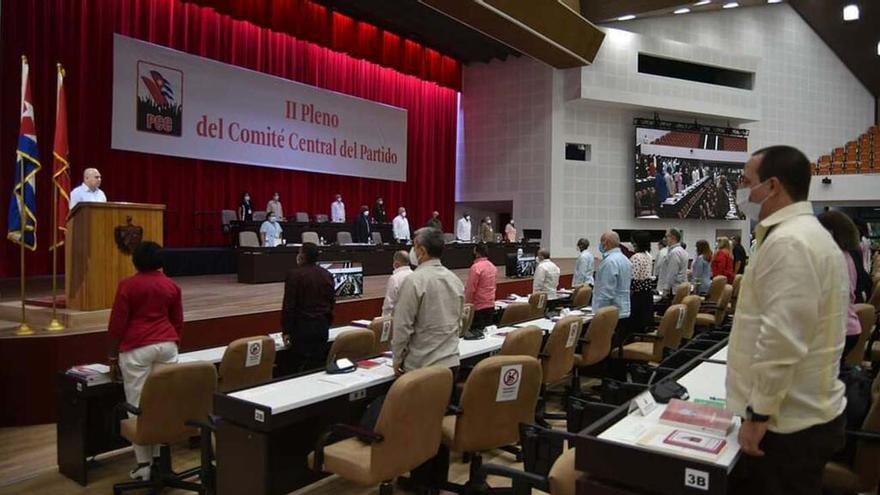
![]() 14ymedio, Havana, October 24, 2021–The first of two sessions of the second plenary of the Central Committee of Cuba’s Communist Party began last Saturday with an analysis focused on economic issues and the functioning of the organization, which brings together 700,000 militants and is consecrated by the Constitution as “the organized vanguard” of Cuban society.
14ymedio, Havana, October 24, 2021–The first of two sessions of the second plenary of the Central Committee of Cuba’s Communist Party began last Saturday with an analysis focused on economic issues and the functioning of the organization, which brings together 700,000 militants and is consecrated by the Constitution as “the organized vanguard” of Cuban society.
The state newspaper, Granma, highlighted the Government’s call to confront the U.S. embargo, the pandemic and subversion. “The virtue will be in knowing how to close ranks in defense of the homeland, entrusted to us by those who preceded us,” said Miguel Díaz-Canel, in the midst of one of the most profound economic and political crises of the last half century.
The 112 meeting attendees — led by Díaz-Canel, in his role as first secretary of the PCC — evaluated the participation of the socialist state enterprise and the contribution to the economy of new arrangements such as micro, small and medium enterprises (mipymes), reported state television.
This was the Party’s first meeting since the protests of July 11th and the repression unleashed by the state against protesters that day. All eyes are on the conclave to determine if from their meeting any directives emerge that would indicate a political and economic opening, or if instead the Party bets on a hardline.
During the event, they also debated over “the need maintain interactions between the militancy and the people,” additional information about the meeting, which will continue through Sunday in the capital’s Convention Palace, and which is not accessible to the foreign press.
Since the popular protests of July, the Cuban government has launched an offensive in neighborhoods where the protests were strongest. Visits by high officials of the Government and the Party have been covered by national media, but they’ve also been surrounded by criticism for the prolonged exclusion from investment and lack of attention by the executive to those vulnerable neighborhoods.
The purpose of the partisan conclave has been to analyze the agreements made during the political body’s eighth congress in April, as it confronted the difficult situation the country was experiencing; decisions applied with a sluggishness that despairs many Cubans, including militants of the only partisan organization recognized in the country.
At that time, delegates tackled the economic reforms announced a decade ago, the functioning of the Party, and the ideological work, but putting those accords into practice has taken longer than expected, a delay exacerbated by the restrictions imposed on the Island by the pandemic.
During that meeting, former president Raúl Castro delegated leadership of the political organization to Díaz-Canel and he also chose the new composition of the governing bodies. Since then he has made appearances on several occasions to support his replacement, the current president of the Island — a political figure who has not managed to gain popularity among Cubans.
The Central Committee of the PCC is the highest governing body of the Party between congressional sessions and is currently composed of 114 members; meanwhile in the Political Bureau, of 14 members only three are women. Whatever comes of this meeting could be the “law tablet” for the next course of organization, the Cuban executive and the entire country.
Translated by: Silvia Suárez
____________
COLLABORATE WITH OUR WORK: The 14ymedio team is committed to practicing serious journalism that reflects Cuba’s reality in all its depth. Thank you for joining us on this long journey. We invite you to continue supporting us by becoming a member of 14ymedio now. Together we can continue transforming journalism in Cuba.
